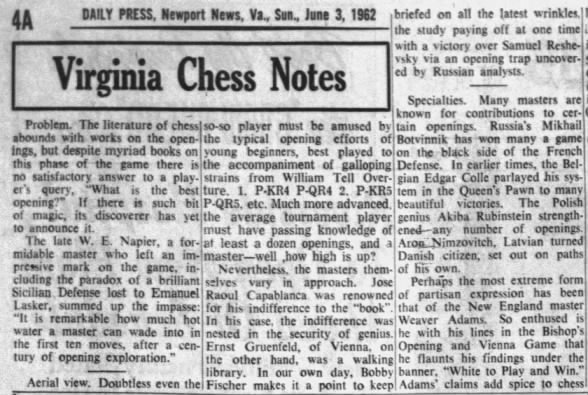Daily Press Newport News, Virginia Sunday, June 03, 1962 - Page 4
 Virginia Chess Notes 03 Jun 1962, Sun Daily Press (Newport News, Virginia) Newspapers.com
Virginia Chess Notes 03 Jun 1962, Sun Daily Press (Newport News, Virginia) Newspapers.com
Problem. The literature of chess abounds with works on the openings, but despite myriad books on this phase of the game there is no satisfactory answer to a player's query, “What is the best opening?” If there is such bit of magic, its discoverer has yet to announce it.
The late W.E. Napier, a formidable master who left an impressive mark on the game, including the paradox of a brilliant Sicilian Defense lost to Emanuel Lasker, summed up the impasse: “It is remarkable how much hot water a master can wade into in the first ten moves, after a century of opening exploration.”
—
Aerial view. Doubtless even the so-so player must be amused by the typical opening efforts of young beginners, best played to the accompaniment of galloping strains from William Tell Overture. 1. P-KR4 P-QR4 2. P-KR5 P-QR5, etc. Much more advanced, the average tournament player must having passing knowledge of at least a dozen openings, and a master—well, how high is up?
Nevertheless, the masters themselves vary in approach. Jose Raoul Capablanca was renowned for his indifference to the “book”. In his case, the indifference was nested in the security of genius. Ernst Gruenfeld, of Vienna, on the other hand, was a walking library. In our day, Bobby Fischer makes it a point to keep briefed on all the latest wrinkles, the study paying off at one time with a victory over Samuel Reshevsky via an opening trap uncovered by Russian analysts.
—
Specialties. Many masters are known for contributions to certain openings. Russia's Mikhail Botvinnik has won many a game on the black side of the French Defense. In earlier times, the Belgian Edgar Colle parlayed his system in the Queen's Pawn to many beautiful victories. The Polish genius Akiba Rubinstein strengthened any number of openings. Aron Nimzovitch, Latvian turned Danish citizen, set out on paths of his own.
Perhaps the most extreme form of partisan expression has been that of the New England master Weaver Adams. So enthused is he with his lines in the Bishop's Opening and Vienna Game that he flaunts his findings under the banner, “White to Play and Win,” Adams claims add spice to chess lore, but occasionally they irritate a critic—for one, Larry Evans in the current issue of the United States Chess Federation magazine, Chess Life. In this connection, it is appropriate to cite the satiric item contributed to the Virginia Chess Federation yearbook some years back. A tongue-in-cheek analyst proposed after study of Adams' variations the score of the shortest game on record: 1. P-K4 Resigns.
—
Practicalities. Regardless of what opening bears what authority's imprimatur, tournament experience suggests that it pays to know the dubious openings, too. We recall from our high school days a certain old-timer who showed a strong disregard for Freeborough and Ranken, Griffith and White, and all other authorities. By that time, Freeborough and Ranken had become somewhat outdated. Griffith and White, however, was not to be dismissed lightly.
The old-timer must have been grounded in texts written by Damiano and Greco; his play was that wild. But whenever his young opponents protested, “That's unsound,” he appeared infuriatingly unimpressed. “Maybe so,” he said, “but prove it.” And wouldn't you know it, none of us could.
—
Time out. The eight grandmasters vying in the Candidates' tournament at Willemstad, Curacao, took a break at the end of the 14th round with a five-day visit to St. Martin Island. At mid-point in the 28-round event standings of players with games won, lost and drawn were reported as follows:






















